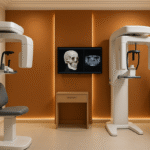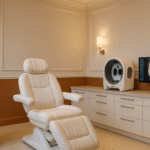- At Home GP Consultations
- IV Therapy at SwissMed Clinic
- Veneers at SwissMed Clinic
- Expert Dermatology Care at SwissMed Clinic
- CBCT & OPG Dental Imaging at SwissMed Clinic
- Laser Hair Removal at SwissMed Clinic
- Dental Imaging and Diagnostics at SwissMed Clinic
- Orthodontics at SwissMed Clinic
- Paediatric Dentistry at SwissMed Clinic
- Dental Implants at SwissMed Clinic
- Oral Surgery at SwissMed Clinic
- Endodontics at SwissMed Clinic
- Restorative Dentistry at SwissMed Clinic
- Cosmetic Dentistry at SwissMed Clinic
- General Dentistry at SwissMed Clinic

Dental Implants at SwissMed Clinic
Dental implants at SwissMed Clinic in Dubai are designed to replace missing teeth with restorations that look natural, feel comfortable, and function reliably. Planning is evidence based and technology enabled, with on-site CBCT imaging that allows precise assessment of bone volume, nerve positions, and sinus anatomy. Your dentist will explain options clearly, set realistic timelines, and outline aftercare so you know what to expect at every stage.
Single and Multiple Tooth Implants
A single implant replaces one missing tooth with a titanium root placed in the jaw and a custom crown attached once healing is secure. The crown is colour matched and shaped to blend with neighbouring teeth and to support healthy contacts for cleaning. When several teeth are missing, two or more implants can support individual crowns or a short bridge. This approach avoids preparing healthy adjacent teeth and helps preserve bone by transmitting chewing forces through the implant to the jaw. Where conditions are suitable, immediate placement at the time of extraction may be discussed. Your clinician will confirm whether this is appropriate based on infection control, bone quality, and bite forces.
Full Mouth Implant Supported Prosthetics
When many or all teeth are missing, implant supported prosthetics restore both function and facial support. Treatment can range from a few implants anchoring a removable overdenture to full arch fixed bridges that are secured to four to six implants. The choice depends on bone quality, smile line, speech requirements, and maintenance preferences. Provisional teeth are used during healing so you can eat and speak with confidence while tissues stabilise. The final bridge is crafted to refine bite, tooth shape, and gum contour for a natural appearance and clear speech. Your dentist will discuss hygiene access, nightguard use if you clench or grind, and recall intervals to protect your investment.
3D CBCT Based Implant Planning
Three dimensional CBCT imaging underpins accurate and safe implant care. A scan maps bone height and width, reveals the position of nerves and sinuses, and highlights any hidden pathology. Digital planning software allows your dentist to select implant size and angulation with millimetre precision and to design a guided surgery approach when indicated. This improves accuracy, can reduce surgical time, and helps protect vital structures. For cases with limited bone, the scan informs strategies such as ridge preservation, sinus lift, or staged grafting, with clear timelines explained before treatment begins. Because CBCT is available on site, imaging and interpretation are coordinated quickly and efficiently.
Your Treatment Journey
Your first visit includes a detailed consultation, clinical photographs, and digital imaging when it will change planning. If you are a suitable candidate, the surgical appointment is scheduled with local anaesthesia and gentle technique. Many patients return to normal routines within a day while following simple instructions for swelling control and oral hygiene. After a period of integration, impressions or digital scans are taken to craft the final restoration. Fitting includes careful bite adjustment and guidance on cleaning around the implant using interdental brushes, floss aids, or water irrigation where helpful.
Aftercare and Maintenance
Long term success relies on good home care and regular professional reviews. Your dentist will set a maintenance schedule that monitors gum health around the implant, checks bite forces, and assesses the integrity of screws and ceramics. Lifestyle and medical factors such as smoking, uncontrolled diabetes, and night-time clenching are discussed honestly so risks can be reduced. If you wear a nightguard, it should be checked periodically to maintain protection.
Frequently asked questions Dental Implants
Am I a candidate for dental implants
Most healthy adults with adequate bone and good oral hygiene are potential candidates. A consultation with clinical examination and CBCT assessment confirms suitability and identifies any preparatory steps that would improve outcomes.
Is the procedure painful
Local anaesthesia keeps the area numb during placement. Mild soreness and swelling are common for a short time and usually settle with routine pain relief and simple home care.
How long does treatment take
Timelines vary with bone quality and the need for grafting. Single implants in good bone often receive final crowns after a healing phase of several weeks. Full arch cases and grafted sites can require a longer, staged plan. Your dentist will map this out for you at the start.
What is the difference between an implant and a bridge
An implant replaces the tooth root and supports a crown independently, which preserves adjacent teeth. A traditional bridge uses neighbouring teeth for support and may require removal of healthy enamel. Your plan will compare the options that fit your mouth best.
Can implants be placed immediately after extraction
Immediate placement is possible when infection is controlled and bone is stable. Your clinician will confirm this after assessing the site clinically and on CBCT.
Do implants set off metal detectors
Dental implants are small medical devices and do not usually trigger airport detectors. You can travel as normal.
How long do implants last
With good hygiene, regular maintenance, and a well balanced bite, implants can serve for many years. Ceramic crowns may need refurbishment over time due to normal wear. Reviews allow early intervention if any component loosens or chips.
What if I do not have enough bone
Bone grafting or sinus lift procedures can rebuild volume. CBCT measurements guide whether grafting is required and the safest way to achieve it. Your dentist will explain materials, healing times, and how this affects the overall plan.
Are implants safe for people with diabetes or smokers
Well controlled diabetes is compatible with implant treatment, though healing may be slower. Smoking increases the risk of complications. Your dentist will discuss risk reduction and whether smoking cessation is advisable before surgery.
Book Your Cosmetic Implant Consultation
If you are missing a tooth or considering a full mouth solution, contact SwissMed Clinic in Dubai to arrange an implant assessment. We will evaluate your case carefully, explain options in clear language, and design a plan that restores your smile with precision and long term comfort.








